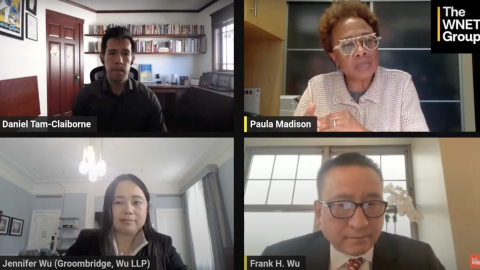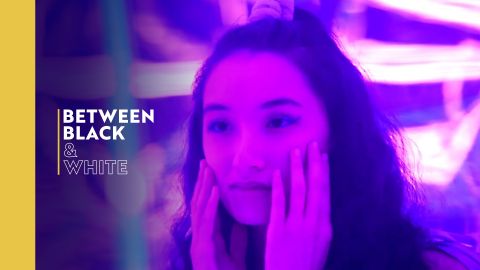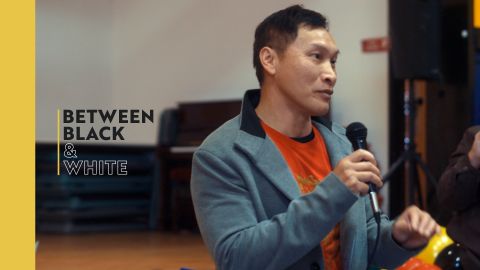DJ Envy: Morning everybody, this is DJ Envy, Angela Yee, Charlamagne tha God, we are the Breakfast Club. We have a special guest in the building. Miss Pat. Good morning. Good morning.
Miss Pat: Good morning. So happy to be here.
Speaker at event: It’s with great pleasure that we present the Pioneer Award to Miss Pat Chen of VP Records.
Miss Pat: 60 years. I’m doing the same thing. When a journalist come to interview me, they were shocked to see a Chinese woman in America selling reggae music.
Miss Pat at event: They didn’t know that a woman can do music, but I’m the one that started. Long, long, long before Bob Marley even got popular.
Graphic:
The record on Miss Pat:
Godmother of Jamaican Reggae Music
Co-founder VP Records —one of the world’s biggest independent reggae label
Still making music at 85 years old
Miss Pat on The Breakfast Club: They always ask me, How do you spot a hit? I would say, not in the boardwalk and not in the studio. The people and the street makes the hits.
Title: From Kingston, Jamaica to Jamaica, Queens
Miss Pat: I was born in Jamaica many, many years ago. From my book, “Miss Pat: My Reggae Music Journey.” This is my mom. My mother was full Chinese and my father full East Indian. Both side of my family were immigrants.
Dr. Anne-Marie Lee-Loy ,Toronto Metropolitan University: The Chinese that came over to Jamaica in the 1920s to the 1930s. They really came for business. They opened up shops.
Miss Pat: My parents opened a shop selling groceries to the community. Although I was Chinese, it didn’t occur to me that I was different because we are first, Jamaica. The kids would play together while the parents would be in the shop.
Dr. Anne-Marie Lee-Loy: In many ways the Chinese shop was a community center, especially in the rural areas.
Miss Pat: It was ingrained in us. That community was very important because if we treat the community right, we’ll have a good, viable business. I think looking back, that’s how I developed my skill of selling and knowing if I sell something that people love, they’ll buy it.
Miss Pat: Music played a big role in Jamaica. Jamaica was a very poor country. So we sing for everything. We sing when we are happy. We sing when we are sad. We sing when we’re working. It gives us hope and gives us a good feeling of happiness.
Graphic: In the 1950s, Miss Pat and her husband opened a tiny record shop in Kingston, Jamaica with a recording studio above the store.
Miss Pat: Producers would go upstairs. After the singing they would be able to cut the disc and run downstairs to get it played to see if the people liked the record or not. During the fifties, Jamaican record was not played on the radio. It was just R&B 24/7. My store was a place where people gathered to hear the music.
Angela Yee: Even Bob Marley came through, right?
Miss Pat: Even Bob Marley came through when he first started. When he was about 16, 17 he used to pass by the store. He use the studio upstairs also. He wasn’t a big star when he first was singing. Everybody sing like Bob Marley in those days. So when he became a hit we had to brush off all the Bob Marley records because they were hot at that time.
Miss Pat: In 1962, we got independence from England and it was a very happy time. That’s where music started to bloom. We sang about what was going on in the country. Most of the songs were like a newspaper. Tell you about the poverty and the changes that they wanted to make. So we use songs to really demonstrate. Not with guns, but with the words and the songs.
Dr. Anne-Marie Lee-Loy: The 1950s and sixties is this real move towards imagining Jamaica as Black peasant space. So, there’s a little bit of discomfort in terms of how do the Chinese fit into that.. In the 1970s there was economic issues as well as violence as well in Jamaica. A lot of middle-class Jamaicans started to leave.
Miss Pat: We were very scared. A lot of business people were moving. So we decided to move. We came to New York in 1977. We had to just come with nothing. We rented a small space. We started a record store. We went 20 years backwards because we were so successful in Jamaica. My husband was fascinated with the name Jamaica because it reminded Jamaica back home.
Miss Pat: In 1977, it was dominantly white neighborhood. Sometimes I was even ashamed to even talk because I didn’t talk very deep patois. Because living in Jamaica, we all talk broken, broken English. So it was hard for me to assimilate. But we was lucky because the Caribbean people and Jamaicans supported us.
Angela Yee: Miss Pat, what about being a woman in this business, right? Because look at you. How tall are you? 4-11?
Miss Pat: Yes, four foot 11.
Charlamagne Tha God: Not when she’s standing on her money though. (laughter)
Miss Pat: Sometimes it was very, very hard for me as a woman because they would say to me sometimes, Could I put on a man on the phone? But little did they know. I spent 20 years on the counter in Jamaica, so I knew all the songs, the singers, the producers, the rhythms. I knew everything about music.
Graphic: In 1993, VP Records launched their own record label and pioneered Reggae’s dancehall craze.
VP Records crossed over to the mainstream with Sean Paul’s “Gimme the Light” in 2002.
Miss Pat at ceremony: This is such a beautiful location, you know. As I grew up, I learned that community was very important, was a big part of our DNA. Jamaica is so gifted in music. Jamaican music is really start from nothing, and they create music from nothing. And it makes me very happy and proud that here is it and I’m part of that.



